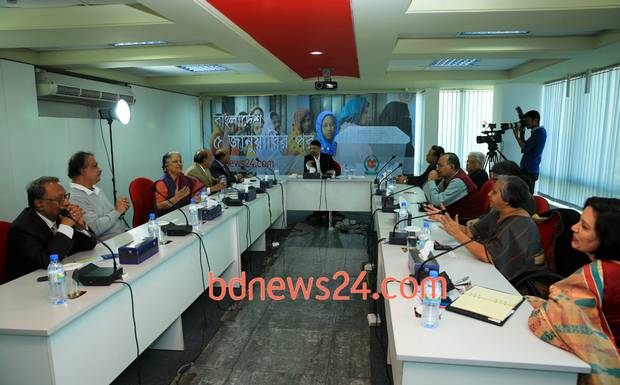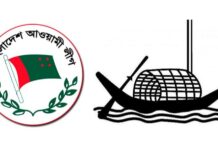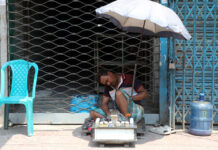Experts at a roundtable have asserted that there are no alternatives other than a consensus among political parties to foster stability leading to economic growth.
Leading politicians, diplomats, economists, analysts and rights activists came together at bdnews24.com on Saturday to join a roundtable titled ‘Bangladesh-After Jan 5.
At the discussion, veteran Awami League leader and Commerce Minister Tofail Ahmed hoped for a congenial environment allowing investments.
But BNP leader Amir Khoshru Mahmud Chowdhury said that stability will not come without a ‘right’ election that represented the people’s will.
All the discussants at the roundtable, except for the BNP representative, called for a political boycott of Jamaat-e-Islami for its atrocities in 1971 and wave of violence over crimes trial and Jan 5 polls.
They made it clear that the political party charged for war crimes has to be wiped off from the political landscape.


Awami League’s Tofail Ahmed sought the BNP’s cooperation in an effort to stabilise the country, even after the party boycotted the last general election.
“In the coming days, the government will work for the prosperity of the country, will take the country forward. An environment to invest and stability will be there as well,” said Tofail, one of the key policymakers of the government.
The war crime trials will continue, he added.
Adviser to the past caretaker government AB Mirza Azizul Islam stressed on the need for drawing up a way to reach a political accord.
The former finance adviser expressed his doubts about how long the current post-election stability will last.
“Consensus has to be reached. Something visible has to be done to bring back the investors, which has to be made through a consensus by talks among the political parties.
“Now a congenial climate for investment is needed. Four-fifths of the investments come from the private sector. In that case, it has to be decided that by when the political accord will happen,” said Mirza Aziz.
BNP Chairperson’s Adviser Amir Khoshru Mahmud Chowdhury echoed Mirza Aziz’s concern about the lasting of the post-polls stability.


“Stability will only come when a right election will be held, when the Parliament will represent the people. For that the BNP is not essential,” he said.
All movements have elements of violence, according to the BNP leader.
“There was violence this time as well. But, state sponsored terrorism topped it, which escalated the violence,” he said.
Branding the government as illegal, Amir Khosru said, “Talks will have to take place.”
Pressing for an ‘impartial election’, the BNP leader said: “Consensus will come through talks. The dialogue should include all the parties, for which the government has to come forward.”
Former Chief Election Commissioner ATM Shamsul Huda said that Bangladesh still had ‘electoral democracy’.
“Several long and short-term measures need to be taken for a consolidated democracy,” he said and accused political parties of “looking forward to short-term benefits”.
“A longer-term institutional development will indeed benefit the political parties,” said Huda.
He hoped for an accord and said that nothing was possible without a long-term plan.


“Consensus solely depends on the two major parties,” added the ex-CEC.
He stressed on strengthening the Constitutional bodies along with human rights and establishing good governance once the issue of polls for democracy and the economy has been dealt with.
Former diplomat Nasim Ferdous put accent on the need for political stability to lure in investment.
“Investors think for at least 20 to 50 years. Political consensus is needed to ensure stability for a longer-term.
“Investors will come back when they will find a congenial environment.”
Communist Party of Bangladesh’s President Mujahidul Islam Selim called upon the Awami League and BNP to arrive at an agreement.
He advised adopting a ‘hard-line’ approach on the issue of Jamaat-e-Islami.
“There are two ways now. The Awami League on the hard-line, the BNP on the soft-line. If the government continues with the hard-line then it will be disastrous for the country.


“Jamaat definitely needs to be eliminated from the political scene. Jamaat will be against the hard-line. The BNP and Awami League should go forward through an accord,” said the veteran politician.
Chief Editor of Ekattor Television Mozammel Babu said: “The Awami League will do everything to wipe Jamaat off,” and the “people will support it”.
Rights activist Ayesha Khanam advised the BNP to shun Jamaat’s association.
“The general people think that BNP is sponsored by Jamaat, a force guided by Jamaat,” said Khanam.
Activist Khushi Kabir, who runs an NGO, said the violence, atrocities and torture over the Jan 5 polls were ‘shameful’ for the country.
She called upon the BNP to again consider parting ways with Jamaat.
“The BNP now needs to re-think. They have to do politics keeping the people’s view in mind. They have to leave those who turn violent against the people.”


Political columnist Salimullah Khan said, “Jamaat unleashed violence to disrupt the war crimes trial. The BNP encouraged it.”
He pressed for a tribunal to try those violence.
“Violence occurred over the elections this time. And the trial of (suspected) war criminals added flare to it. It’s now time to think whether something can be chalked out only for the run-up to the polls,” said Khan.
On the note of banning Jamaat, he said those who would ally with ‘terrorists’ would be identified as ‘terrorists’ themselves.
“If the Jamaat is outlawed as a terrorist party, those who would join hands with such outlawed party will be identified in the same way. These matters should be dealt with through a consensus.”
Editor-in-chief of bdnews24.com Toufique Imrose Khalidi moderated the roundtable.
The discussion held at bdnews24.com’s office was webcast live on the site and televised on Ekattor Television.
Source: bdnews24










